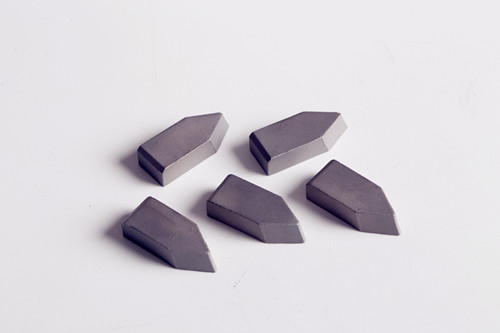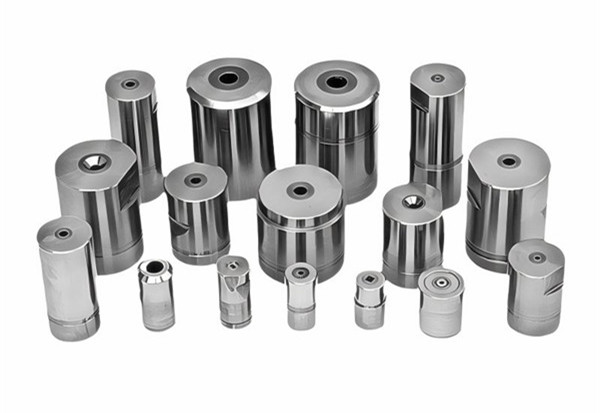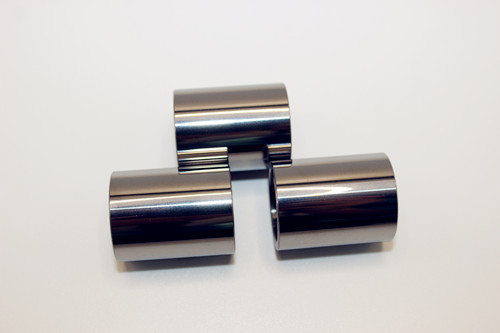YG6 carbide
I. Definition and classification of YG6 carbide
YG6 carbide is a tungsten-cobalt cemented carbide, one of the standard Chinese cemented carbide grades and a relatively common one. It is made from tungsten carbide (WC) and cobalt (Co) through a powder metallurgy process, with a typical composition of 94% WC and 6% Co. Its density is approximately 14.6-15.0 g/cm³, and its hardness reaches 89.5-92 HRA. Its grain size is typically controlled within the range of 0.8-1.2 μm, placing it in the medium-grained alloy category. It combines high strength with moderate toughness, offering high wear resistance, flexural strength (≥145 MPa), and high-temperature stability.
II. Physical and Mechanical Properties
1.Basic Physical Parameters
Density: 14.6-15.0 g/cm³, significantly higher than that of ordinary steel (7.85 g/cm³). This high density ensures stability during high-speed cutting. Melting point: approximately 2870°C (WC phase). Cobalt’s melting point is 1495°C, but the alloy maintains structural integrity at 1280°C.
Coefficient of thermal expansion: 4.9×10⁻⁶/°C. This low thermal expansion effectively reduces dimensional deformation in high-temperature environments.
2.Mechanical Properties
| Performance Parameters | Value Range | Test Standard |
| Hardness (HRA) | 89.5-92 | GB/T 7997-2014 |
| Flexural Strength | ≥145MPa | ISO 3327:2009 |
| Impact Toughness | 2.6J/cm | ASTM B406-22 |
| Compressive Strength | 4600MPa | GB/T 1041-2008 |
Experimental data shows that YG6 maintains stable hardness and strength below 800°C, with a performance degradation rate of less than 15% between 800°C and 1000°C, making it suitable for high-temperature applications such as metal cuttings, chemical pump bushings, and oil drilling tools.
III. Chemical Composition and Preparation Process
1.Component System
Tungsten Carbide (WC): 94% forms a hard skeleton, providing wear resistance and high-temperature stability.
Cobalt (Co): 6% acts as a binder to enhance toughness. Every 1% increase in Co content increases flexural strength by approximately 80 MPa.
Minor Additives: Some products contain ≤0.5% tantalum carbide (TaC) or niobium carbide (NbC) to inhibit grain growth and improve thermal fatigue resistance.
2.Preparation Process
Ingredients: Mix powders in a ratio of 94% WC and 6% Co.
Wet Milling: Add alcohol and a forming agent to a ball mill at a ball-to-bearing ratio of 8:1. Grind for 48 hours to a particle size of D50 = 1.2μm. Drying and Granulation: Dehydration is performed at 120°C in a spray dryer to form flowable granules.
Pressing: Pressing is performed under a pressure of 100 MPa into the desired shape.
Vacuum Sintering: Heating at 1420°C for 2 hours allows liquid cobalt to promote particle bonding, resulting in a density of 99% of the theoretical value after cooling.
IV. Typical Applications
1.Cutting Tools
Tool Manufacturing: Used for machining difficult-to-cut materials such as hardened steel (HRC 45-55) and stainless steel, with tool life increased by 5-8 times compared to high-speed steel.
Geological Drill Bits: When drilling rock formations, YG6 drill bits offer 30% higher penetration efficiency than ordinary steel drill bits and exhibit excellent wear resistance.

2.Mold Manufacturing
Cold Stamping Dies: Suitable for drawing steel/non-ferrous metal wire with a diameter of <20 mm, with a die life of over 100,000 cycles.
Precision Pressing Dies: Used for forming bearing rollers, with a surface roughness Ra ≤ 0.4 μm and a dimensional accuracy of ±0.005 mm.

3. Wear-Resistant Parts
Petroleum Industry: YG6 coating extends the corrosion life of pump rod couplings by 2-3 years.
Aerospace: The coating on engine turbine blades exhibits superior oxidation resistance compared to nickel-based alloys at 1000°C.

V. Technical Advantages and Limitations
1.Core Advantages
Outstanding Wear Resistance: Under dry cutting conditions, YG6 tool flank wear is only 0.02mm/1000m, surpassing YG8 (0.035mm/1000m).
High-Temperature Stability: Hardness retention is ≥90% at 800°C, making it suitable for high-speed cutting and dry machining.
Corrosion Resistance: Rust-free for 72 hours in a 5% NaCl salt spray environment, making it suitable for marine engineering applications.
2.Limitations
High Brittleness: The impact toughness (2.6J/cm²) is lower than that of ordinary steel (30-50J/cm²), requiring the avoidance of shock loads.
High Processing Cost: Fluctuations in the price of cobalt, a raw material, directly impact costs, and precision machining requires specialized equipment. Conclusion
YG6 tungsten carbide achieves a balance of hardness, toughness, and heat resistance through optimized WC-Co ratio and grain control. Its widespread application in cutting tools, mold manufacturing, and wear-resistant parts demonstrates its core value as the “tooth of industry.” In the future, with breakthroughs in ultrafine grain technology (grain size <0.5μm), the YG6 series of materials will play an even greater role in high-end fields such as aerospace and new energy equipment.
Our company is among China’s top ten tungsten carbide products manufacturers. Should you require cemented carbide products, please contact us(info@wolframcarbide.com).
